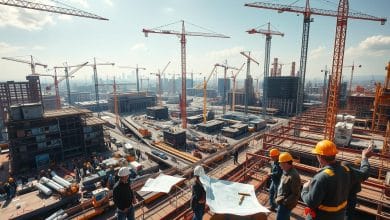Maintenance Worker Jobs in Italy with Visa Sponsorship: Step-by-Step Process
Anúncios
Italy’s bustling cities like Rome, Florence, and Venice are actively seeking skilled professionals for roles in building care and facility management.
Recent data highlights growing opportunities in this sector, with employers offering visa support to qualified international candidates. Positions range from entry-level roles to technical specializations, providing pathways for career growth and cultural immersion.
The industry thrives on consistent demand, ensuring stable employment for those entering the field. Many roles require minimal formal education, making them accessible to newcomers. Workers often gain hands-on experience while contributing to innovative practices, such as eco-friendly cleaning methods that align with Italy’s sustainability goals.
Foreign professionals bring fresh perspectives to historic and modern architectural spaces, solving unique challenges across Italy’s diverse infrastructure. This multicultural environment fosters collaboration, helping international hires build local networks and adapt to Italian work culture. For many, these positions serve as stepping stones toward long-term residency or entrepreneurial ventures in the maintenance sector.
Understanding the application process for visa-sponsored roles is critical. Employers prioritize practical skills, adaptability, and language proficiency, though requirements vary by region. Aspiring candidates can leverage Italy’s demand for reliable talent to secure opportunities that blend professional development with life in one of Europe’s most culturally rich destinations.
Navigating the Application and Visa Sponsorship Process
Securing employment in Italy’s facility care sector requires careful navigation of legal and procedural steps. Non-EU candidates must partner with sponsoring employers to obtain proper authorization, ensuring compliance with local regulations. Preparation of accurate documentation helps protect applicants from delays or legal complications during immigration reviews.
Work Authorization Essentials
Employer-sponsored visas or EU Blue Cards serve as the foundation for legal employment. Applicants must provide proof of age (minimum 18 years), health clearance certificates, and education records equivalent to middle school completion. While advanced technical roles may require specialized training, most entry-level positions prioritize practical skills over formal credentials.
From Offer to Arrival: Key Steps
The pathway to employment follows four critical phases:
- Obtain a formal job offer from an Italian employer
- Submit visa application with notarized contract and background checks
- Complete medical evaluations and vaccination requirements
- Apply for residence permits within eight days of arrival
Language flexibility exists in tourism-centric regions, though basic Italian proficiency strengthens candidacy. Candidates working in sensitive environments must provide comprehensive criminal history reports. Successful applicants receive guidance from employers to finalize residency paperwork aligned with contract durations.
Maintenance Worker Jobs in Italy: Opportunities and Industry Trends
Italy’s preservation of cultural landmarks and modern infrastructure creates diverse openings in property upkeep. Urban centers and tourist hotspots drive particularly high demand for skilled professionals. Three key factors sustain this growth: aging architectural assets, expanding hospitality venues, and evolving sustainability standards.
Compensation Patterns and Qualification Requirements
Earnings reflect specialization levels, with entry-level roles starting at €1,200 monthly. Technical positions like HVAC specialists reach €1,800, while supervisory roles approach €2,000. Northern cities typically offer 15-20% higher wages than southern regions.
Mandatory credentials vary by position:
- Pest control licenses for sanitation roles
- Technical diplomas for equipment handlers
- Safety certifications for heritage site workers
Corporate Recruitment Strategies
Major employers like ISS Facility Services and Sodexo Italia prioritize cross-cultural teams. Manutencoop dominates large-scale contracts, while Markas specializes in healthcare environments. These firms frequently sponsor visas for candidates demonstrating:
- Equipment operation experience
- Basic Italian communication skills
- Adaptability to historic preservation protocols
Recent industry reports highlight a 22% increase in green cleaning technologies adoption. This shift creates opportunities for professionals versed in eco-conscious methods, particularly in UNESCO World Heritage sites.
Exploring Job Roles and Responsibilities in Cleaning & Maintenance
From historic museums to modern office complexes, professionals in this field keep spaces functional and safe. Roles vary widely, offering pathways for skill development and specialization. Many positions emphasize practical expertise over formal education, creating accessible entry points.
Diverse Career Paths from Janitorial to Supervisory Roles
Entry-level positions focus on essential tasks like floor care and waste management. These roles help protect public health by maintaining strict hygiene standards. Workers often advance to technical specialties such as electrical repairs or HVAC systems within 12-18 months.
Supervisors coordinate teams across multiple sites, balancing schedules and quality checks. Specialized roles include window cleaning for high-rises and industrial machinery sanitation. Companies like Dussmann Service train staff for multilingual environments, while Gruppo Gesan focuses on government contract standards.
Integrating Eco-Friendly Practices and Modern Technologies
Many employers now prioritize biodegradable cleaners and water-saving equipment. CNS workers in hospitals use UV-C disinfection tools to reduce chemical usage. Digital platforms track task completion rates and equipment maintenance needs in real time.
Smart sensors monitor air quality in historic buildings, preserving artifacts while saving energy. These innovations align with national sustainability targets, creating demand for tech-savvy professionals. Training programs often cover IoT devices and energy-efficient workflow optimization.
Conclusion
Building care roles in Italy offer more than employment—they open doors to cultural and professional growth. The sector provides international professionals with structured visa support through established companies, particularly in urban hubs. Stable demand across healthcare, education, and hospitality ensures consistent opportunities for those pursuing European careers.
Earnings grow alongside expertise, with specialized positions doubling initial salaries within progressive frameworks. Many advance to leadership roles or launch independent ventures, leveraging hands-on experience gained through Italy’s unique architectural challenges. Their work directly supports community health by upholding rigorous sanitation standards in high-traffic environments.
From Renaissance-era sites to contemporary complexes, professionals engage with diverse settings requiring technical adaptability. Multicultural teams foster language skills and local connections, aiding long-term integration. Accessible training programs and clear progression routes make this field a practical choice for building sustainable futures abroad.
For more information, explore the official visa website mentioned in this article:
You will be redirected to another website
FAQ
What types of work visas are available for technical roles in Italy?
Non-EU applicants typically apply for a Decreto Flussi visa or a EU Blue Card. Employers must prove no qualified Italian/EU candidates are available before sponsoring foreign workers.
How long does the hiring process take for facility management positions?
From job offer to visa approval, it usually takes 3–6 months. Delays often occur during document verification or quota availability checks under Italy’s annual immigration quotas.
Which industries have the highest demand for skilled technicians?
Hospitality, manufacturing, and infrastructure sectors show strong growth. Companies like Eni, Leonardo S.p.A., and Italferr frequently recruit for equipment upkeep and sustainability projects.
Are certifications required for specialized maintenance careers?
Certifications like OSHA safety training, HVAC licenses, or ISO 14001 (environmental management) boost employability. Fluency in Italian and familiarity with Building Automation Systems are often preferred.
What eco-friendly practices are shaping Italy’s facility management sector?
Employers prioritize energy-efficient systems, waste reduction strategies, and renewable energy integration. Technicians trained in solar panel maintenance or smart building technologies see increased opportunities.
Do supervisory roles require additional qualifications?
Leadership positions often demand 5+ years of experience, advanced problem-solving skills, and project management training. Companies like CBRE and ISS Facility Services promote internally but also hire externally for these roles.
Published on: 25 de August de 2025

Luke Martin
Luke Martin, author of Credwallets.com, is a mathematics graduate with a specialization in financial markets. Known for his love of pets and his passion for sharing knowledge, Luke created the site to provide valuable insights into the complexities of the financial world. His approachable style and dedication to helping others make informed financial decisions make his work accessible to all, whether they're new to finance or seasoned investors.







